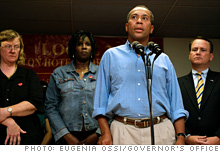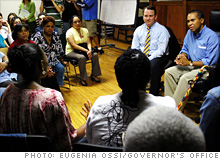A mess: Hyatt's housekeeping scandal
Since the hotel giant fired 98 room cleaners and replaced them with cheap labor, the backlash has been sharp, including a call for a nationwide boycott.
 |
| Mass. Gov. Deval Patrick, whose administration is pushing for Hyatt to reinstate the fired employees. |
 |
| Gov. Patrick (right) and Lt. Gov. Tim Murray (with tie) meet with laid-off workers and union leaders in downtown Boston. |
BOSTON (Fortune) -- What was Hyatt thinking? That no one would notice? That no one would care? Well, the privately held hotelier, which announced plans recently to go public, screwed up big-time; everybody knows that now. Even Hyatt knows, although something tells me it hasn't completely sunk in yet.
"I think that we feel that there are certain aspects of the transition that we could have managed better," says Farley Kern, a Hyatt spokesperson, "and that we really do regret that."
The transition? Here's what Hyatt did: At 3 o'clock on a Monday afternoon, Aug. 31, managers at two Hyatt-owned hotels in Boston and one Hyatt-managed hotel in Cambridge, in a coordinated effort, summoned their entire housekeeping staffs, fired everybody on the spot, and immediately outsourced the jobs to a staffing company based in Atlanta.
Lucine Williams, a single mom from Barbados who worked at the Boston Hyatt Regency for nearly 22 years, remembers the moment. "I could not believe my ears," she says. "I was in shock. People start crying. I start crying. And after we start crying, they say you can go get your package."
Williams's "package" was two weeks' pay plus one week for the first five years of service (never mind the other 17), for a grand total of $4,289.60. "I know you're upset," a supervisor said to her as she was leaving for the locker room to change out of her uniform, "but can I have your name tag?"
Here's what we gradually learned, beginning several days later with a front-page story in the Boston Globe: That most of the 98 fired housekeepers were immigrant women; that some of them had been working for Hyatt for more than 20 years; that before they were fired, they were directed to train their replacements under the guise that the newcomers would be available to spell them during vacations; that whereas the job had once paid nearly $16 an hour, it now paid minimum wage in Massachusetts, $8 an hour; and that henceforth, housekeepers would be expected to clean up to twice as many rooms in a day to meet their quotas.
Here's what happened: All hell broke loose.
Local 26 of Unite Here, the hotel workers union, which has never had a contract at any Boston-area Hyatt, nevertheless rushed to the aid of the fired workers, organizing a press conference and a big downtown demonstration.
In Chicago, about 200 union hotel workers, upset with the slow pace of contract talks in the Windy City, got themselves arrested for blocking hotel entrances and took advantage of the spotlight to publicize the plight of their sisters in Boston.
The Boston Taxi Drivers Association threatened to refuse all fares to and from Hyatt hotels in Boston. And Massachusetts Governor Deval Patrick, a Democrat facing what could be a tough reelection campaign next fall, threatened a Hyatt boycott covering anyone on state business unless the fired workers were rehired.
Even the Globe's consistently liberal editorial page suggested the governor was going a little bit too far this time: "The Hyatt Corp.'s heavy-handed firing of 98 hotel housekeepers rightly offends Governor Patrick's sense of fairness. But the governor's emotions seem to have gotten the better of him....[H]e is setting a dangerous precedent."
Hyatt, now trying to defuse the situation, last week offered the fired workers a new deal. Not their old jobs back, but a choice: Either a new job with a different staffing company, at the old rate of pay, guaranteed through the end of 2010; or career counseling and job retraining, also at the old rate, through next March. Either way, they'd get to keep their health insurance coverage for six more months.
The Hyatt 100, as they're now known, thought about the offer over the weekend. Then on Monday, they voted overwhelmingly to reject it. Now the union is calling for a nationwide Hyatt boycott.
Matthew Walker, Unite Here's national director of strategic affairs, says the union has contracts at 40% of Hyatt hotels nationwide. "I wouldn't give them marks for being the worst union-busters," he says. That said, he has "never seen a wholesale elimination of the housekeeping department like they've done in these three hotels. I'm quite sure the company was interested in watching this as a case study."
Hyatt denies that. "This does not represent any kind of corporate-wide initiative," says Farley from headquarters in Chicago, taking pains to distance corporate headquarters from this mess. "It was a decision made by the managers in Boston in response to conditions in Boston."
Except that it may be too late to erase quickly the reputational damage. Already Hyatt's Wikipedia entry contains a reference to the incident. Bloggers from The Atlantic and Harvard Business Review have weighed in, unflatteringly. Now comes new pressure on Hyatt board member Penny Pritzker, whose cousin, Tom Pritzker, is chairman, and whose family controls most of the company's stock.
Pritzker was national finance chair for the Obama campaign. Once rumored to be a candidate for Commerce secretary, she settled for a seat on the President's Economic Recovery Advisory Board. Which strikes union official Walker as ironic.
"These are service sector jobs," Walker says. "These are jobs that cannot be exported, and when they pay a living wage and provide benefits, as these jobs did in Boston, they're a critical underpinning of our local economy."
Good point. Sounds like something the President's Economic Recovery Advisory Board might want to look into. ![]()
-
 The retail giant tops the Fortune 500 for the second year in a row. Who else made the list? More
The retail giant tops the Fortune 500 for the second year in a row. Who else made the list? More -
 This group of companies is all about social networking to connect with their customers. More
This group of companies is all about social networking to connect with their customers. More -
 The fight over the cholesterol medication is keeping a generic version from hitting the market. More
The fight over the cholesterol medication is keeping a generic version from hitting the market. More -
 Bin Laden may be dead, but the terrorist group he led doesn't need his money. More
Bin Laden may be dead, but the terrorist group he led doesn't need his money. More -
 U.S. real estate might be a mess, but in other parts of the world, home prices are jumping. More
U.S. real estate might be a mess, but in other parts of the world, home prices are jumping. More -
 Libya's output is a fraction of global production, but it's crucial to the nation's economy. More
Libya's output is a fraction of global production, but it's crucial to the nation's economy. More -
 Once rates start to rise, things could get ugly fast for our neighbors to the north. More
Once rates start to rise, things could get ugly fast for our neighbors to the north. More







